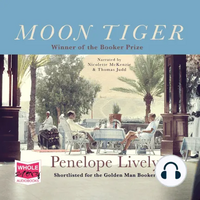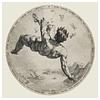Take a photo of a barcode or cover
This was a choice for my book group. Curiously, I found I had it on my shelf, and had even read it, back in 2002. I remembered absolutely nothing about it, and even the re-read didn't rouse any memories, good or bad. Lively is a talented writer, yes, but the skilfully constructed story left me curiously unmoved. The personality of Claudia has a lot to do with that -- narcissistically superior to almost everyone she meets, except her brother Gordon, she is spiteful to and contemptuous of everyone she considers beneath her, including her own daughter. So I just couldn't engage with her. The best parts of this book were the evocative descriptions of wartime Egypt, where Lively spent some of her childhood; at their best, these reminded me of Lawrence Durrell's Alexandria Quartet. But that's part of the problem: there's nothing original or surprising about this novel.
emotional
reflective
sad
slow-paced
Plot or Character Driven:
Character
Strong character development:
Complicated
Loveable characters:
Complicated
Diverse cast of characters:
Complicated
Flaws of characters a main focus:
Yes
Need an example of a flawed character? Penelope Lively created one in Claudia Hampton, a historian who is dying of cancer. Laying in her hospital bed, drifting in and out of consciousness, and skipping through her 70 plus years with no regards to chronology, Claudia decides to write a history of the world with herself as the main character. Featured in this history are the main players in Claudia's life: her brother Gordon, daughter Lisa and others, but above all her ex-lover Tom Southern. At the heart of this novel is Claudia's remembrance of her time with Tom in Egypt during World War II. This story of what happens in Egypt goes a long way towards explaining why Claudia Hampton is the way she is. The most heartbreaking part of this novel is, in my opinion, when Claudia wonders what Tom would make of the woman she has become. I usually have a hard time reading a novel which features a character I can not stand. Claudia is self-centered, arrogant, and a very bad mother. She is also brilliant and fascinating. In her lovely prose, Lively creates a character that you probably will not like but respect.
I don't tend to read books because they won prizes, but this one has only been on my TBR list because it won the Booker and something about it appealed to me (at some point in time--I can neither remember why or when).
I loved the voice in this novel and the way the perspective would change early on almost seamlessly between points of view leaving me feeling the kind of disorientation and confusion I imagine may one day come in my elder years (should I live long enough). I adored the cheeky character of Claudia, whom I somewhat associated with [b:I, Claudius|18765|I, Claudius (Claudius, #1)|Robert Graves|https://i.gr-assets.com/images/S/compressed.photo.goodreads.com/books/1388185810l/18765._SY75_.jpg|4232388] given the number of early "I, Claudia" self-references she made.
But beyond voice and character, I found my interest waning the more I read (which usually manifests itself in me picking up other books first or starting new books in the midst of one like this). Enjoyable, but not one of my favorites.
I loved the voice in this novel and the way the perspective would change early on almost seamlessly between points of view leaving me feeling the kind of disorientation and confusion I imagine may one day come in my elder years (should I live long enough). I adored the cheeky character of Claudia, whom I somewhat associated with [b:I, Claudius|18765|I, Claudius (Claudius, #1)|Robert Graves|https://i.gr-assets.com/images/S/compressed.photo.goodreads.com/books/1388185810l/18765._SY75_.jpg|4232388] given the number of early "I, Claudia" self-references she made.
But beyond voice and character, I found my interest waning the more I read (which usually manifests itself in me picking up other books first or starting new books in the midst of one like this). Enjoyable, but not one of my favorites.
One thing that can be said of Booker Prize winners that you can never be sure what you will be in for reading one. Moon Tiger I found to have a strange appeal. The premise - the elderly narrator Claudia reaching the end of her life and 'writing' a book on the history of the world sounds intense and difficult. Oddly, despite being appropriately vivid, deep and meaningful, Moon Tiger is an comforting novel. I'm sure there are dozens (if not thousands) of novels out there with the message 'life goes on' but this is the only book I've read that embodies that theme and communicates it covertly without over the top epiphany's and monologues.
If I may be allowed a tiny spoiler, the story is not in fact a history of the world, but actually a history of Claudia (who wrote history books) the episodes from her life that she shares share themes of love, war, relationships and death and while at times the narrative is a kaleidoscopic jumble of other's (or is that what Claudia thinks other's think?) and Claudia's Point of View, the book never feels confusing or hard to follow.
The book is light on cheesy tension and drama, and I have no idea how Lively managed to make such a compelling book without some form of suspense. If you're scared of the requiem type premise don't panic, for me at least the book did not jerk tears, but instead sat comfortably in my head, leaking thoughtfulness.
If I may be allowed a tiny spoiler, the story is not in fact a history of the world, but actually a history of Claudia (who wrote history books) the episodes from her life that she shares share themes of love, war, relationships and death and while at times the narrative is a kaleidoscopic jumble of other's (or is that what Claudia thinks other's think?) and Claudia's Point of View, the book never feels confusing or hard to follow.
The book is light on cheesy tension and drama, and I have no idea how Lively managed to make such a compelling book without some form of suspense. If you're scared of the requiem type premise don't panic, for me at least the book did not jerk tears, but instead sat comfortably in my head, leaking thoughtfulness.
brilliant novel. i liked everything about this. great story, very smart writing and incomparable storytelling. there's history and natural history, two of my favorite topics. Claudia Hampton is a truly memorable character. curiously enough, i had just finished a very similar novel, Goodnight Irene. both feature WWII as their backdrop, both have strong independent women protagonists, but Goodnight Irene paled in comparison to Moon Tiger. this is the real deal, a real classic. so glad i found it.
I see I’m in the minority on this one. I can only describe this book in one word: pretentious. It is written as though it were meant to be a sweeping classic, but it never quite hit the mark for me. I’m also sure V.C. Andrew’s would be proud
Last month I spent a day and a night in the desert. I had almost given up on the idea of going on this particular trip to Jordan just because of the fact that it included a day and a night in the desert (which meant sleeping in a tent, so kind of out of my comfort zone). And then I just didn’t and went for it.
Before the trip, I had kept thinking there would be insects or things crawling, there had been mentions of the night being really chilly there, so I had kept picturing some how I was going to be shivering and not be able to sleep at all for the whole night. How I was going to hate it.
Fast forward, I loved the desert. It was not cold (at least, not even by far as cold as I had expected it to be during the night) and there were no insects. In fact, it was nothing like I had imagined it to be. And it was the best experience ever… a real adventure. Walking in the sand barefoot trying to reach the top of a dune or another to get a better perspective over the Martian landscape or drinking Bedouin tea while sitting on the sand in a semicircle, facing Mecca in the middle of nowhere while waiting for the sunset... Such simple things, yet so fulfilling.
And now, with this experience still fresh and vivid in my mind, I stumble not on one, but two books in which the desert plays a part (still reading the second one). What were the odds? I did not read the blurbs, so I was not influenced by them to pick these books, but felt strangely drawn to them at this particular moment in time. A fortunate stroke of serendipity to say the least.
Claudia is 76 and dying of cancer. So, she decides to write a history of the world, seen from her perspective. Following Zeno’s idea that time is composed of moments (of “nows”), she writes a non-chronological history. She strongly believes “that nothing is ever lost, that everything can be retrieved, that a lifetime is not linear but instant. That, inside the head, everything happens at once”. Following this logic, she just goes back and forth in time, jumping from a moment to another, from a perspective to another and concocts her own history of the world. She can go back to Egyptian times or to the Aztecs and Montezuma and then just jump forward in time to the harsh reality of troops playing versions of deadly chess with human pawns, games of advancing and retreating in the desert, during the fights of WW2 that took place in Egypt.
Having just had the Jordan experience, mentions of mirages, sandstorms, blazing sun, merchants being pushy and shouting in all directions “Cheap price, cheap price, I offer you a cheap price” in order to convince you to buy their merchandise, as well as Arabian nights references added an extra flavour for me to this book.
The writing is good, quite brilliant at times. The love story is great. The characters are totally unlikable (except for Tom), but Claudia, flirting with incest and maverick as she is… well, I… if not liked her, I sort of admired her in the end for the originality, for the strength of character and the courage to be different, to not be brainwashed by the times she was living in (although this didn’t really ring true to me for those times: since she was the one that kept saying several times that we were all prisoners of our times and preconceptions, wasn’t she supposed to be one as well?).
Oh, and about the writing. Again. I had got to 93% of this book and realized that I had simply missed too many (important) episodes from it because of frustration with its style, which is… well, all over the place. Stream-of-consciousness type. So I decided to go back and I read like 70% of it again. (This had only ever happened before with “Wolf Hall”.) And it all started to add up really nicely. So, it was totally worth it.
Before the trip, I had kept thinking there would be insects or things crawling, there had been mentions of the night being really chilly there, so I had kept picturing some how I was going to be shivering and not be able to sleep at all for the whole night. How I was going to hate it.
Fast forward, I loved the desert. It was not cold (at least, not even by far as cold as I had expected it to be during the night) and there were no insects. In fact, it was nothing like I had imagined it to be. And it was the best experience ever… a real adventure. Walking in the sand barefoot trying to reach the top of a dune or another to get a better perspective over the Martian landscape or drinking Bedouin tea while sitting on the sand in a semicircle, facing Mecca in the middle of nowhere while waiting for the sunset... Such simple things, yet so fulfilling.
And now, with this experience still fresh and vivid in my mind, I stumble not on one, but two books in which the desert plays a part (still reading the second one). What were the odds? I did not read the blurbs, so I was not influenced by them to pick these books, but felt strangely drawn to them at this particular moment in time. A fortunate stroke of serendipity to say the least.
Claudia is 76 and dying of cancer. So, she decides to write a history of the world, seen from her perspective. Following Zeno’s idea that time is composed of moments (of “nows”), she writes a non-chronological history. She strongly believes “that nothing is ever lost, that everything can be retrieved, that a lifetime is not linear but instant. That, inside the head, everything happens at once”. Following this logic, she just goes back and forth in time, jumping from a moment to another, from a perspective to another and concocts her own history of the world. She can go back to Egyptian times or to the Aztecs and Montezuma and then just jump forward in time to the harsh reality of troops playing versions of deadly chess with human pawns, games of advancing and retreating in the desert, during the fights of WW2 that took place in Egypt.
Having just had the Jordan experience, mentions of mirages, sandstorms, blazing sun, merchants being pushy and shouting in all directions “Cheap price, cheap price, I offer you a cheap price” in order to convince you to buy their merchandise, as well as Arabian nights references added an extra flavour for me to this book.
The writing is good, quite brilliant at times. The love story is great. The characters are totally unlikable (except for Tom), but Claudia, flirting with incest and maverick as she is… well, I… if not liked her, I sort of admired her in the end for the originality, for the strength of character and the courage to be different, to not be brainwashed by the times she was living in (although this didn’t really ring true to me for those times: since she was the one that kept saying several times that we were all prisoners of our times and preconceptions, wasn’t she supposed to be one as well?).
Oh, and about the writing. Again. I had got to 93% of this book and realized that I had simply missed too many (important) episodes from it because of frustration with its style, which is… well, all over the place. Stream-of-consciousness type. So I decided to go back and I read like 70% of it again. (This had only ever happened before with “Wolf Hall”.) And it all started to add up really nicely. So, it was totally worth it.
“I saw the stark textural immensity of the desert, the sand carved by the wind, the glittering mirages."
adventurous
challenging
dark
emotional
mysterious
reflective
sad
tense
medium-paced
Plot or Character Driven:
Character
Strong character development:
Yes
Loveable characters:
Complicated
Diverse cast of characters:
Complicated
Flaws of characters a main focus:
Complicated
This is the story of Claudia. She is a history writer. We follow her from childhood to her nursing home where she is dying. She is a tough, and taciturn lady that makes her own rules. I really like how she addresses the complexity of relationships one person possesses. We are essentially different for various people, never quite the same. My one criticism is that there were historical bits that were just not very interesting. But I liked history as a metaphor for our own stories and how they are told and by whom. There were points where I was ready to give up, but near the end of the novel, it all came together for me. Reflective books are my Roman Empire. I give this one a 5/5.
adventurous
challenging
emotional
funny
informative
reflective
sad
medium-paced
Plot or Character Driven:
Character
Strong character development:
No
Loveable characters:
Complicated
Diverse cast of characters:
No
Flaws of characters a main focus:
Yes
I struggled with the jumping perspectives in the audiobook. And the privilege. But the wisdom about history, memory and war was wonderful. And the characters brilliant.
Graphic: War
Moderate: Incest, Miscarriage, Violence, Vomit, Colonisation




